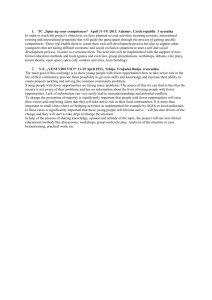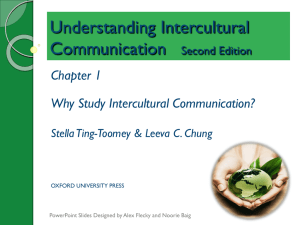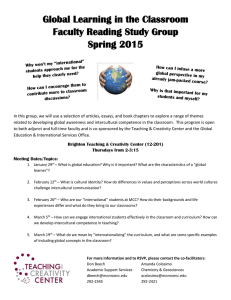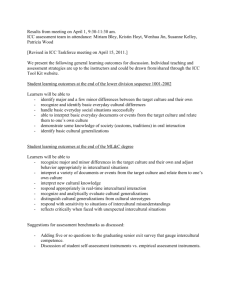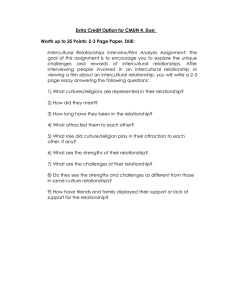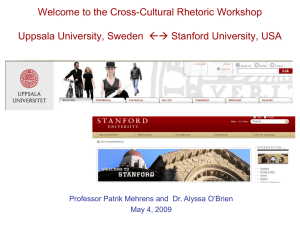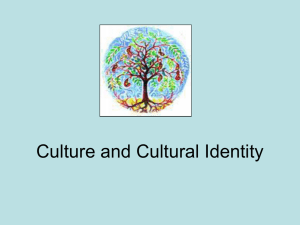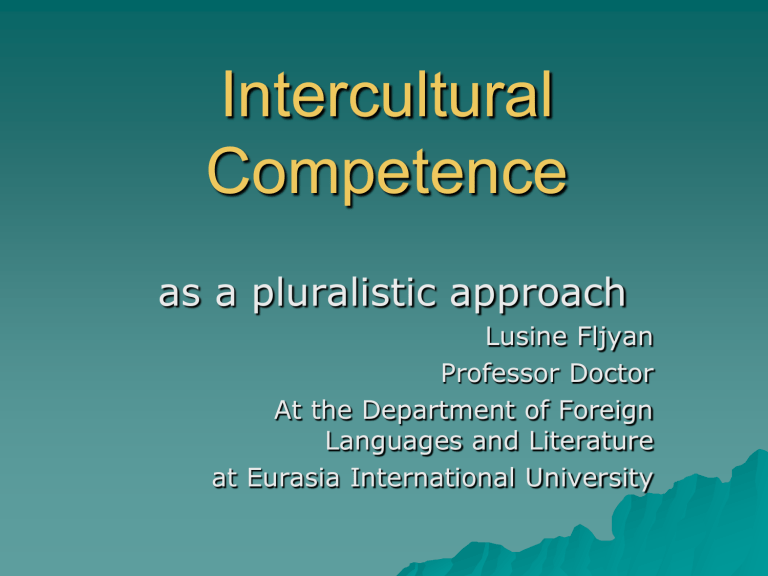
Intercultural Competence as a pluralistic approach Lusine Fljyan Professor Doctor At the Department of Foreign Languages and Literature at Eurasia International University What is ICC? ‘transcending the limitations of one’s own world view’ (Fantini 2000, p.31) Through an education for ICC: We open up to other ways of thinking and other ways of logic We find a tongue in which we can speak our humanity to each other We learn to see that our own view of the world is just one among many (Willems 2002: 19) What is the specific aim of ICC as a pluralistic approach? I’m Polish, and I was invited for dinner while in Paris together with an Englishman and a Spaniard. We all arrived at the door at the same time. Our host asked us to come in. Being the only lady in the group I tried to go in first, but I did not have the time as the Englishman preceded me. The Spaniard then kept the door open for me and made a gesture inviting me in before him. We passed a comment about how rude the Englishman was! I’m French. Before going to China I learned a few essential phrases and felt very confident in my ability to communicate. Soon after I arrived there, I found myself in front of a cake stall. I pointed my finger at the object I desired and said “Those two” in Chinese, pointing my finger at the object. The seller hesitated a little, looked at my fingers and started to put more and more cakes in the bag. “No, no, two” I repeated again putting two fingers on my nose. She filled the bag and asked me to pay for my custom. I was very frustrated, and only later did I learn that placing the thumb and the index finger on my nose pointing outwards meant ‘eight’. Your intercultural experience No. 1 Think of an unhappy intercultural incident in which you were involved and found yourself at a loss understanding what was going on. Write it down. Share it with your neighbour and explain why it was strange for you. In our day to day encounters, what happens the moment we realise that, for example: things are not working out as usual we’re not being understood the other person’s behaviour is strange we cannot make sense of what’s happening someone was offended unintentionally We experience... Surprise Discomfort Irritation Shock Anger Losing face Humour What happened to the fish? It was surprised to see the tadpole change into a frog It was curious to hear about the new world the frog described upon his return It was only able to partly ‘understand’ the world outside the water, and only from it’s own point of view The fish did have... Curiosity/Interest in diversity (3)* Receptiveness to diversity (5)* Motivation to observe...(8)* Desire to find out about other cultures (9.5)* *(CARAP/FREPA resources: Attitudes) But the moment it left the water The fish failed...why? It had A false sense of confidence in her ability False expectations about adjustment A lack of true understanding of cultural dynamics (Bennett 1993) Having a few, isolated resources is not enough. In Byram’s (1992:11) words, the fish remained “firmly anchored in her own values and culture” ICC as a pluralistic approach is not really about the fish... ...Could it be more about the tadpole and the frog?! My intercultural experience I was part of an international group of colleagues about to enter an Austrian restaurant for an evening meal. Next to me was an Austrian gentleman who, as soon as we got to the door rushed to open it. At first I thought he was really polite and so I quickly moved forward towards the door. However, to my amazement, he stepped ahead of me, and entered before me. Sequel... I was slightly offended, but once we were seated he explained to me that in Austria it was considered polite for a man to precede the woman upon entering, and to let the woman out first when leaving the building! I think he had noticed that I felt uncomfortable with his action, and gave me the opportunity to discuss our customs and expectations for a while. After that little talk I enjoyed the meal better! Notice that this time... Although there was again an ‘uncomfortable’ intercultural event, the conclusion was different. This Austrian gentleman possessed that kind of intercultural competence described in the Guide: “...the capacity to interpret another way of life and to explain it to those who live another.” (Guide, p. 32) The Austrian gentleman had the relevant competences as described in CARAP/FREPA (p. 126): A competence in resolving conflict, clarifying misunderstanding (C1.1) A competence in mediation (C1.3) A competence of decentring (C3) A competence in recognising the ‘other’ (C7) There needs to be a mobilisation of a sophisticated network of global competences and resources Your intercultural experience No. 2 Think of another intercultural event, with a happy and successful ending Write it down Share it with your neighbour Together try to identify the competences and some of the resources (in CARAP/FREPA) mobilised for its successful outcome What happens to you as a result of your intercultural experiences? Sometimes you feel like the fish ICC is NOT simply about learning to look at the world through somebody else’s pair of glasses “Nor is the new competence kept entirely separate from the old. The learner does not simply acquire two distinct, unrelated ways of acting and communicating” (CEF, p. 43) ICC is NOT about encoding and decoding messages and symbols (Ma 2003) Do you sometimes feel like a tadpole turning into a frog? In tackling new experiences... We are constantly changing, constructing evolving identities, redefining our cultures, creating new meanings, forming new understandings... As the language learner becomes plurilingual and develops interculturality: “The linguistic and cultural competences in respect of each language are modified by knowledge of the other...” (CEF, p. 43) ICC is NOT An approach to changing our natural behaviour “The learner of a second or foreign language and culture does not cease to be competent in his or her mother tongue and the associated culture.” (CEF p. 43) “Linguistic and cultural competences... enable the individual to develop an enriched, more complex personality and enhanced capacity for further language learning and greater openness to new cultural experiences.” (CEF, p. 43) ICC involves A conscious understanding of the process of adaptation (Bennett 1993) A high degree of meta-linguistic, metacognitive, and other meta- capabilities - As in our CARAP/FREPA ICC is NOT A (singular) Competence BUT A sophisticated network of Global Competences, mobilising Resources of Knowledge, Attitudes, Skills A singular view of ICC C1 C2 C3 A pluralistic view of ICC C1 C2 ICC C4 C3 ICC as a pluralistic approach Learning a language Teacher of a European language Understanding another cultural group/s (and one’s own) Teaching/learning activities involving several languages European teacher of languages Developing of a network of competences and resources Теacher Education Тeacher education is charged with the “demographic imperative” (Banks, 1995) to prepare teachers to understand how culture influences student success or lack thereof. As one means of preparation, teacher educators require teacher candidates to participate in field experiences with multicultural populations. Still, candidates sometimes resist the notion that culture matters in the classroom. Teacher Dispositions Individual teacher dispositions regarding cultural diversity become an issue. Ladson-Billings (1994) reports that teachers are not at ease recognizing student diversity, and asserts that teachers assume that they must provide the “same” instruction for students in order to be “equal.” Many teachers use a colorblind approach and maintain that “we are all alike under the skin, aren’t we?” (Landsman, 2009, p. xi), which is a gross mistake Culturally Responsive Teachers Multicultural teacher educators counteract these colorblind and negative perceptions of diverse students by promoting culturally responsive teaching —the Vol. 13, No. 2International Journal of Multicultural Education 2011 3concept that teachers must respond differently to students based on diverse cultural identities and learning needs , or be “culturally responsive” (Gay, 2000; Morrison, Robbins, & Rose, 2008). Gay defines culture as “social values, cognitive codes, behavioral standards, worldviews, and beliefs” (2000, p. 8) that are “dialectic and dynamic” (p. 10). She makes explicit the multidimensional “mitigating variables” and “expressive behaviors” that are culturally -influenced, but not stereotypically predictable that students bring to the classroom. Challenges in Translating “Culturally Responsive Teaching” Because of the complexity of culture, there are challenges in translating “culturally responsive teaching” for teacher candidates. First, there is the problem of guiding candidates to acquire a deep, not shallow, understanding about a “cultural group” (Hollins, 1996) and to have some understanding about a cultural group’s funds of knowledge (Moll, 1990). Second, if a teacher candidate gain some understanding of a “cultural group, ” the candidate must resist stereotyping and then teaching “prescriptively according to broad, under-examined generalities about groups” (Gutierrez & Rogoff, 2003, p.20). Challenges in Translating “Culturally Responsive Teaching” Third, teachers must see students as members of multiple cultural groups rather than one cultural group such as race or ethnicity. Fourth, teacher candidates sometimes state that it is impossible to respond to cultural differences because of the multiple cultures represented in one classroom (Cockrell, Placier, Cockrell, & Middleton, 1999). Finally, candidates must understand that one’s cultural identity positions a person to experience various forms of oppression and privilege due to hegemonic and institutional power dynamics (Cochran -Smith, 2004) Teacher’s Sociocultural History Simultaneous to leading candidates to a more complex understanding of culture and people, multicultural teacher educators assert that candidates must examine their own socio-cultural history. Such an examination will promote candidates’ cognizance of their own complex cultural identities and influence their perceptions of others. Through this study of culture and self, candidates can develop a socio-cultural consciousness (Villegas & Lucas, 2002) or “see with a cultural eye” (Irvine, 2003), a lens through which teachers can perceive and understand the socio -cultural, political, and economic influences on diverse groups’ access to education. This sociocultural consciousness becomes the foundation for all culturally responsive teaching. Grazzi Thankyou Merci Danke Gracias Köszönöm References Abram, I. (2004) ‘Intercultural learning and young children’. In van Keulen (Ed.) Young children aren’t biased, are they?. Amsterdam: SWP. Beacco, J-C & Byram, M. (2003) Guide for the development of language education policies in Europe. From linguistic diversity to plurilingual education. Council of Europe Bennett, M.J. (1993) ‘Towards ehtnorelativisim: a developmental model of intercultural sensitivity’. In Paige, R.M. (Ed.) Education for the Intercultural Experience. Maine: Intercultural Press, Inc. Byram, M. (1992) ‘Foreign Language Learning for European citizenship’. In Language Learning Journal, 6, September, 10-12. Camilleri Grima, A. (2002) How Strange! The use of anecdotes in the development of intercultural competence. European Centre for Modern Languages/Council of Europe. Council of Europe (2001) Common European Framework of Reference for Languages: Learning, teaching, assessment. Council of Europe and Cambridge University Press. Fantini, A.E. (2000) ‘A Central Concern: Developing Intercultural Competence’. SIT Occasional Paper Series, Issue No. 1. Ma, L. (2003) ‘Is there an essential difference between Intercultural and Intracultural communication?’. In Journal of Intercultural Communication, Issue 6, Feb. 2003-May 2004. Rodriguez, A. (2002) ‘Culture to Culturing’. In Journal of Intercultural Communication, Issue 5, April 2002. Street, B. (1993) ‘Culture is a Verb. Anthropological aspects of language and cultural process’. In Graddol, D., Thompson, L., and Byram, M. (Eds.) Language and Culture, BAAL and Multilingual Matters Ltd. Weaver, G.R. (1993) ‘Understanding and coping with cross-cultural adjustment and stress’. In Paige, R.M. (Ed.) Education for the Intercultural Experience. Maine: Intercultural Press, Inc. Willems, G. M. (2002) Language teacher education policy. Promoting linguistic diversity and intercultural communication. Strasbourg: Council of Europe.
